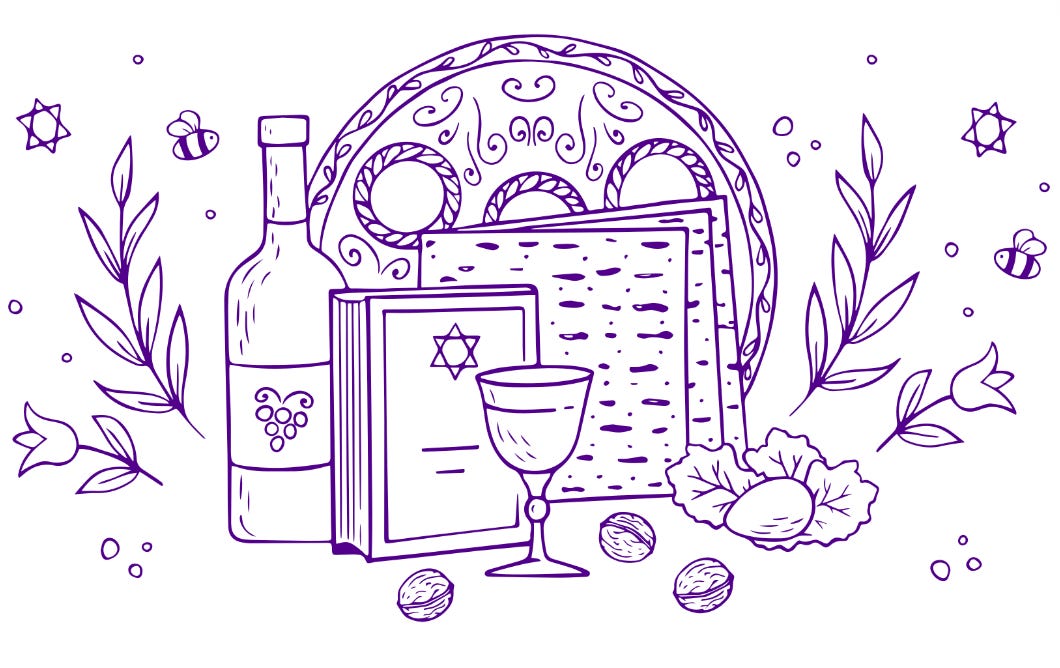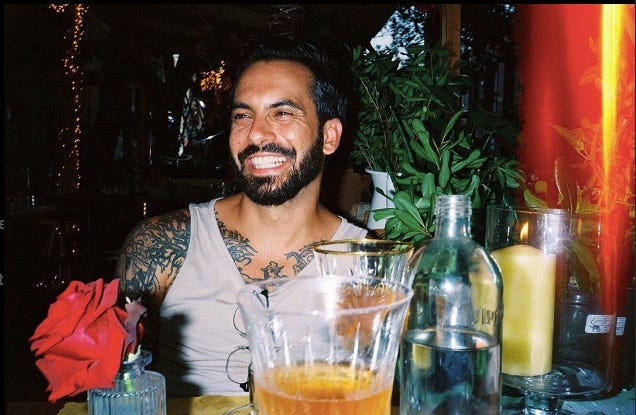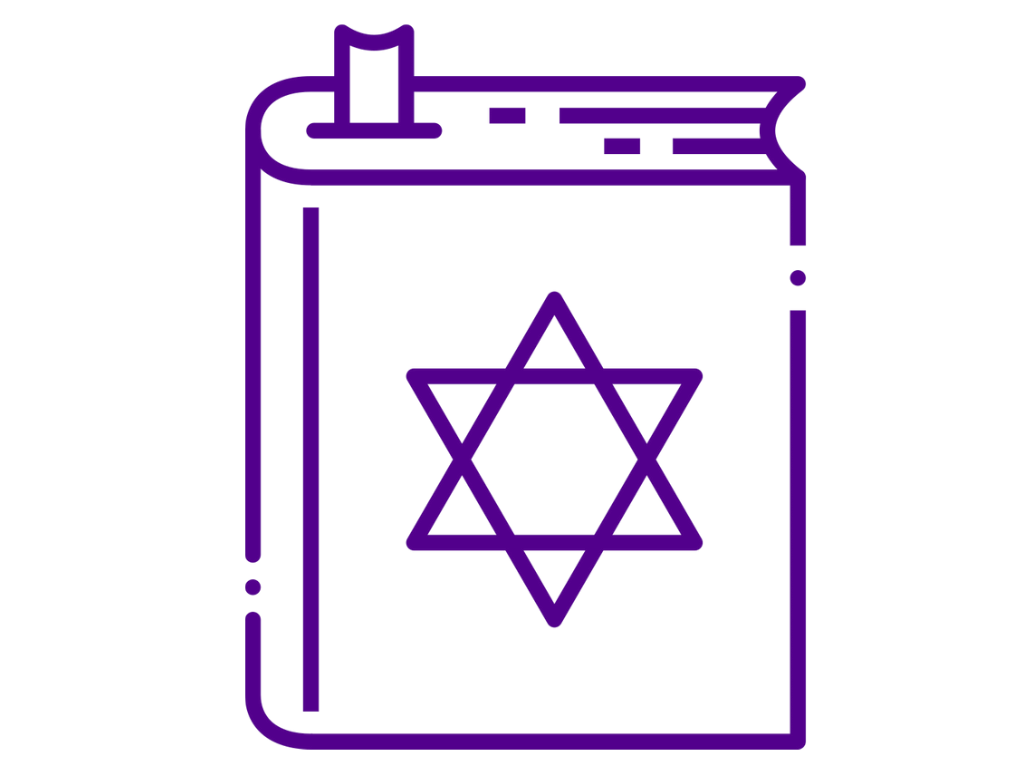Meet Vince, a Jew de Vivre 🎉
After attending a Passover seder years ago, Vince was inspired to convert to Judaism. Our conversation inspires me to continue my spiritual path and not take it for granted.
Why is this Passover different from all other Passovers? I don’t have to spell it out for you, but if I must… we’re embroiled in war, freedom feels out of reach when our hostages are still in Gaza, and most days, it feels like the whole world hates us. Geesh, maybe I’ll pass on the maror this year; I already have enough bitterness to out-kvetch a gaggle of old ladies!
I know we Jews tend to focus on the suffering part, but don’t forget that the Exodus has a happy ending. We eventually are liberated and united, and begin the journey toward “making things official” with G-d, but not without a little more kvetching.
I recently had an uplifting conversation with a new friend who is converting to Judaism. He was inspired to convert by a Passover seder he attended years ago. While I don’t need to be reminded of how awesome the seder is, it felt extra important to hear his enthusiasm on his spiritual journey, especially given the events of this year and especially around the idea of Jewish continuity. May we all be inspired by Vince’s journey and curiosity, and find liberation and peace soon. Chag sameach.
-Miranda
P.S. The first night of Passover is my mom’s birthday! Go wish my beautiful, talented mother a happy birthday in the comments!
Vince, where in your conversion process are you?
I began in September 2022 and I’ll be finishing in May!
What have you learned in class?
There’s so much! It’s a crash course of the holidays, Shabbat, kashrut, marriage and sex, death, the Torah, the Shoah, G-d and the afterlife, Hebrew, and life-cycle events.
What initially drew you to convert?
When I was 21, I went to a Passover seder in Minneapolis with my friend Max’s family. It was my first Jewish experience, and it was mind-blowing to me. The fact that questioning is encouraged and is an intrinsic part of the seder was really cool and unique in terms of spiritual experiences. This profoundly spiritual experience in someone’s home, with no clergy, was really different from the Catholic tradition I was raised with. The idea that nothing is ever really settled is liberating. Also, the food was imbued with ritual meaning, and that was really amazing. There’s a randomness to eating a bitter herb and not randomness to it. It felt constructed but not arbitrary. The fact that it was simultaneously cultural and religious. It felt old… vibrant and alive, but really old at the same time.
What are you doing for Passover this year?
I’ve been seeing a nice Jewish girl for a few months and I’m going to her family for seder.
What’s been challenging for you during your conversion process?
There’s been a lot. Hebrew is tough to learn. The opportunities for learning or travel are geared towards people in college or college grads, whihc is fine, but being 35 is different. My priorities have shifted which has been really cool and difficult. A lot of social settings I used to find interesting have become a lot less meaningful or more antisemitic. That’s been heartbreaking, but now I have this meaningful part of my life that I used to not have, which is amazing, and things pale in comparison, even before 10/7. After 10/7, things that used to interest me just became a lot more difficult.
Be real with me… is there anything in Judaism you don’t like?
I don’t like benching. I delight in not benching because I find it boring. Also, women not being able to read from the Torah bothers me.
What denomination is your conversion?
My rabbi was ordained at what is called by both its advocates and detractors as “open orthodox,” so I’m getting a liberal, open-orthodox conversion. Conversion is actually a juridical question. In terms of who I am, that’s much less of a legal question. As for denomination, most of the Jews I know are Ashkenazi and I daven in an Ashkenazi format. The denominations are a bit of a crisis for Ashkenazi Jews; for Sephardic Jews there is just one denomination, or a lack of denominations. I’m comfortable in traditional prayer spaces with the full traditional liturgy but at heart I’m a pluralist. I don’t know if that makes me orthodox. It’s not really a question I ask myself; I’m just going to be Jewish.
What has surprised you?
I didn’t expect to lose my taste for pork. I’ve tried eating pork within the last year and I couldn’t.
What’s been an inspiring or fun part of the journey?
My social life is a lot better. There are a lot of opportunities to hang out with people, something as simple as Shabbat lunches or Shabbat dinners. There’s parties and holidays all the time. There’s hanging out after shul. People will also invite you out to do all types of stuff which I would like to be a part of more. I would love to have more regular friendships with people I’ve met in religious spaces.
How has your understanding of Judaism evolved?
That it’s just as much a tribe as it is a religion, and that it’s tribal in a non-metaphorical sense. I think most religions function in a way where belief precedes practice, and practice precedes belonging. In Judaism, it’s the opposite, where belonging precedes practice, which precedes belief.
I was drawn to Jewish thought and spirituality when I encountered it during Passover and was blown away by it. Then I went to shul and read the siddur – I wiped tears from my eyes so they wouldn't get on the siddur. For example, I was moved by all the stuff that talks about the personification of Shabbat, like greeting the Sabbath bride. I’ve talked to other converts who opened the siddur and also felt blown away by it. I encountered Jewish thinking and Jewish spirituality via Jews but then I realized that yeah, sure, there are Jewish ways of thinking and ways of asking questions, but you’re marrying into a people, regardless if you have a spouse or not. You’re wedding the whole people. You’re becoming them. It’s a tribe you can join.
What do you think about joining the tribe during high levels of antisemitism?
When you start to become Jewish, it’s like you relearn antisemitism. I had an adequate Holocaust education in my public school back in Wisconsin. But when you start to realize your neshama is Jewish, it’s different. Imagine if, on your 18th birthday, your dad sits you down and says, “There are some things about you that I want you to know that might explain how I move in the world and things that I’ve overcome that I’m proud of. Let me tell you about my crazy childhood...” And he tells you all these horrible, heartbreaking things. That’s what it feels like learning about antisemitism when converting. It’s not directly to you but it’s to your family. That, and admiration for the Jewish people having gone through so much but not letting it get them down. Jews have this joie de vivre given the circumstances.
That was my relationship to antisemitism before 10/7. Post 10/7 it’s similar - the heartbreak has only deepened - but I’m more worried and concerned about long-term trends than in the past. I’m committed to Jewish continuity and Jewish thriving. There’s an added layer to it.
Jew de vivre is definitely going to be the title of this post. So, what does Jewish continuity look like to you?
Hanging out with each other and being good to each other, whether you have a family or not. One of the things I didn’t expect was reading the prayers for the United States in the back of the siddur. I became a lot more patriotic very shortly after attending services. This country has a really troublesome, perplexing history but it is non-coincidental that Jews have done well here, as well as in Canada and Australia, and that is something worth valuing and preserving. Whatever has worked for Jews here, we need to be a part of continuing that. In terms of Jewish continuity, keeping your chin up about it. The State of Israel needs to exist as a Jewish democratic state, absolutely positively, and not lowering your voice about it.
What’s your favorite Jewish holiday?
Rosh Hashanah. It’s really spiritual. You have to think about yourself a lot. Plus, it’s during a lovely time of year. April is wretched where I’m from; it’ll snow on Passover sometimes. On Rosh Hashanah, the food is super sweet and you’re preparing for Yom Kippur, but Yom Kippur is really intense.
Favorite Jewish food?
Kreplach! I had it at my friend Gideon’s house for Shabbat dinner. I just love a meat dumpling.
Lastly, what are you up to this week for Shabbat?
I’m going to a Shabbat dinner! I actually had pre-existing plans and just forgot that this was the “big Shabbat” before Passover, so on Saturday I won’t actually be in shul. You forget a million little things like this when you’re still converting.





Loved reading about your journey; welcome to the tribe! ✡️💙🇮🇱☮️
I love this! Converts usually know the faith on a much deeper level than those of us born into the tribe.